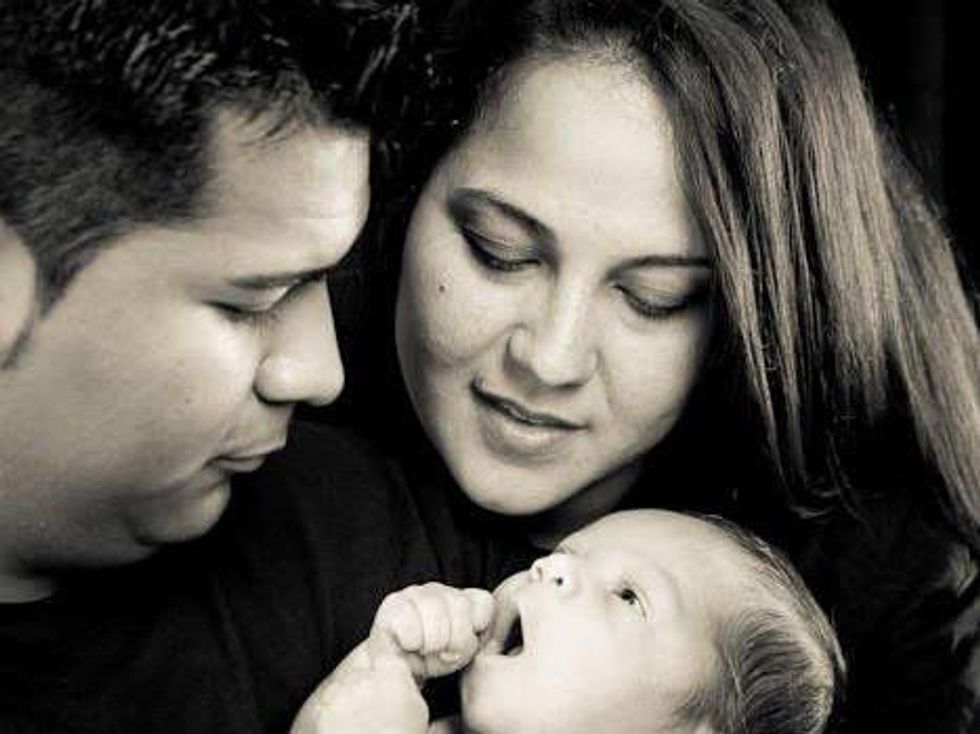Matter of Life and Death
Brain-dead pregnant woman remains on life support despite husband's wishes
A North Texas woman is making headlines across the country from the intensive care unit at John Peter Smith Hospital in Fort Worth. At 14 weeks pregnant, Marlise Munoz was rushed to the hospital on November 26, 2013, after her husband, Erick Munoz, reportedly found her unconscious.
According to information released by the Crowley Professional Firefighters Association (where Erick and Marlise worked as paramedics), Marlise has not shown any brain activity since being admitted. It is believed she suffered a pulmonary embolism.
Family members — including her husband — have publicly said they do not want to keep her on life support. Marlise is now 19 weeks pregnant. The couple already has a 1-year-old son, Mateo.
SMU law professor and medical ethicist Tom Mayo says it's not illegal for a doctor to withdraw life support on a pregnant patient in Texas; it just means the hospital would lose immunity protection.
It's an exceedingly rare situation, one that has shined a spotlight on a little-known portion of Texas law. "We have never had a case like this before," says hospital spokesperson J.R. Labbe.
Labbe believes the hospital's hands are tied: "We can't withdraw treatment from a pregnant person as the law states."
Labbe is referring to a section of the Texas Advance Directives Act that reads, "A person may not withdraw or withhold life-sustaining treatment under this subchapter from a pregnant patient." The hospital plans to keep Marlise on life support until the baby comes to term and is able to be delivered.
"Mr. Munoz's issue is not with hospital. It is with the law," Labbe says.
Others have called into question the hospital's interpretation of the law. Tom Mayo, an SMU law professor and medical ethicist, says it is not illegal for a doctor to withdraw life support on a pregnant patient in Texas; it just means that the hospital would lose the immunity protection guaranteed by the statute. As long as the hospital follows the Texas Advance Directives Act, it cannot be sued or subject to disciplinary action from professional boards.
A separate section of the Texas Advance Directives Act states that nothing in the statute makes unlawful any action that would have been lawful before the act was passed in 1999. Because it wasn't previously illegal to take a pregnant woman off life support provided she had a living will or a designated surrogate, it isn't illegal now.
Although it is not known if Marlise Munoz has a living will, her husband appears to be acting as her surrogate, meaning he has the right to make end-of-life decisions for his wife.
"It puts the hospital in the position of choosing between what the surrogate wants and what the doctor and hospital want with their immunities," Mayo says. "To say that we are required by law to continue treatment on a pregnant patient and then invoke this statute, that just strikes me as wrong."
There's another layer to the controversy: Is Marlise Munoz brain-dead and therefore no longer a patient at the hospital at all? "If Ms. Munoz is brain-dead, she does not have a terminal or irreversible condition. She has no condition," Mayo says.
Mac Stewart, a health law lawyer with the firm Stewart & Strong, says the statute doesn't allow for existential arguments. "The bottom line is that you cannot withdraw life support if a patient is pregnant. It's as straightforward as it can be."
The only question remaining for Stewart is when the fetus becomes viable and thus able to be delivered. Labor and delivery nurse Jillian Ludwig says 24 weeks is generally the soonest a fetus is determined viable.
"Studies show that before that time, the chance of survival or any type of quality of life is too minimal, and the risk outweighs the benefit for the baby," Ludwig says.



